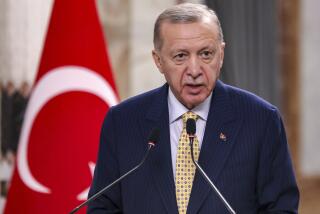Soviets Seek Wider Global Financial Ties : Wooing of China, the West, OPEC Linked to Political Changes
- Share via
MOSCOW — Soviet officials said today that the Kremlin has made overtures to China, the West and the Organization of Petroleum Exporting Countries in an apparent effort to broaden economic ties with the outside world.
Ivan D. Ivanov, the Foreign Ministry official recently named to oversee international economic relations, said at a news conference that the Kremlin is studying China’s economic reforms and looking into possible joint business ventures with Western nations.
Ivanov also confirmed that the Soviet Union has asked to participate as an observer in negotiations next month under the General Agreement on Tariffs and Trade. He said the Kremlin wants to become a “full-fledged member” of the Geneva-based organization, which seeks to reduce trade barriers.
Foreign Ministry spokesman Gennady Gerasimov said at the same briefing that Moscow has agreed to Iran’s request to cut oil exports to the West by 100,000 barrels a day for the next two months to help stabilize world oil prices.
Gerasimov said he does not know what percentage of Soviet oil exports the cutback represents or how it will affect earnings from oil sales. The move is intended to bolster OPEC’s attempts to reduce the current world oil glut, he said.
Deep Cuts Sought
Iran, one of the oil cartel’s 13 member nations, has been pressing for deep production cuts to push prices up. Iranian Oil Minister Gholamreza Aghazadeh visited Moscow this week.
Ivanov and Gerasimov released few details of the proposed economic moves.
The efforts to expand economic ties with such a diverse array of nations appeared to signal a desire for a larger Kremlin role in world economic affairs. It coincides with a Soviet re-examination of political relations with other countries under Mikhail S. Gorbachev, who became the Communist Party’s general secretary in March, 1985.
The Foreign Ministry has been reorganized and portfolios redistributed among the 13 deputies to Foreign Minister Eduard A. Shevardnadze. New desks have been created in the ministry to deal with such topics as economic ties and disarmament.
One of the most visible policy changes has been increased wooing of China, with which relations soured in the late 1950s over ideology and border disputes.
Talks With China
Ivanov said First Deputy Premier Nikolai Talyzin, who heads the Soviet planning agency Gosplan, will talk with Chinese counterparts about economic reforms under Chinese leader Deng Xiao-ping and exchange planning information.
Ivanov, asked if any joint ventures with Western nations are in the offing, replied: “Such possibilities are being discussed in this country.”
He said Soviet officials decided in June--after a discussion with businessmen from the United States, Western Europe and Japan--to set up a special legal commission to analyze possible ventures.
Ivanov was asked whether the Soviet Union is planning to join the International Monetary Fund.
“No contacts between the monetary fund and the Soviet Union are under way at present,” Ivanov said. Soviet involvement with the fund is unlikely, in part because of the fund’s use of U.S. dollars as its currency, he said. The Soviet domestic economy uses the non-convertible ruble.
More to Read
Sign up for Essential California
The most important California stories and recommendations in your inbox every morning.
You may occasionally receive promotional content from the Los Angeles Times.










